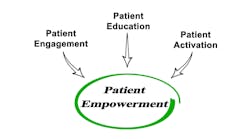Chances are Americans could soon have access to information previously viewed only by their physicians, said Ernie Hood, CIO and vice president of Seattle's Group Health Cooperative, at American Health Insurance Plans (AHIP) Conference in San Diego.
It's an embarrassment, Hood said, that such access doesn't already exist. The good news is, thanks to advances in technology, things may be changing. With the rising cost of healthcare, members are insisting more on transparency, and providers are hard pressed not to give it.
At Group Health, Hood has chosen a non-traditional EMR implementation approach. "We're going to implement it for the patients, not for the doctors," he said. The program has been successful, giving members access to patient messaging, prescription refills and lab results.
According to Hood, one Group Health Cooperative member sent an e-mail saying he started out leery of the healthcare organization, but became quite enthused.
â€â€˜The clincher,’†Hood said as he read a member's e-mail, â€â€˜is your online service. It blew me away. All I can say is that it's about time someone let the average person take a peek in their medical history, which until now was taboo by most doctors. I feel most relaxed, sittin' in my jammies, finding out in plain English what's going on with my health.' It's about service and access, even at home, in bed, 2 a.m.," Hood says, which is exactly the time the e-mail was sent.
Carole Waite, senior vice president, service division, Blue Cross Blue Shield of Massachusetts (Quincy, Mass.) spoke too of the shift in models — from physician-centric to consumer-centric — a common AHIP thread. At BCBS of Massachusetts, Waite implemented a concierge style of healthcare. According to Waite, collecting data is a great responsibility, and healthcare personalization is about more than just information. "Our responsibility is to take that data and turn it into something that is living and breathing," she says. "It's not just about finding out about things, it's about how you use it."Offering a variety of ways of communicating has allowed Waite's group to focus on, as she said, providing, "the right information, through the right channel at the right time." Healthcare is moving from a "monologue to a dialogue" Waite says, and knowing "how to be effective and communicate with members about what's important to them" is critical. "Members are not just calling us on the phone anymore," she says. They might telephone, send an e-mail or text message from their BlackBerry.
"Products and options are complex," Waite says. "Personalization is one way to make healthcare manageable." Waite's concierge approach is based on knowing who the member is in regard to health status, contact preference and even languages spoken.
To be sure her organization is providing the right information to its members, Waite's group takes polls, asking what members would like to know more about. She's found that they only want information that directly pertains to them — and they want it to be specialized and personalized. Waite knows that the data is available: it's in sales, it's in service and it's in finance.
"Members are telling us information all the time," she says. "But historically we've had no place to put it, no place to store it." Her solution would be a data warehouse to provide a multi-dimensional view across the organization. "It's about getting that information in there and then getting that information out of the data warehouse in the right way."
Author Information:Stacey Kramer

